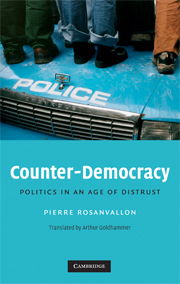Introduction
Published online by Cambridge University Press: 24 May 2010
Summary
The democratic ideal now reigns unchallenged, but regimes claiming to be democratic come in for vigorous criticism almost everywhere. In this paradox resides the major political problem of our time. Indeed, the erosion of citizens' confidence in political leaders and institutions is among the phenomena that political scientists have studied most intently over the past twenty years. National and comparative research has yielded a clear diagnosis. The literature on voter abstention is also abundant. Significantly, even the newest democracies suffer from this affliction, as a glance at the formerly Communist countries of Eastern Europe and the erstwhile dictatorships of Asia and Latin America shows. How are we to understand this situation, which has been variously described as a “crisis,” a “malaise,” a “disaffection,” and a “breakdown”? Most explanations invoke a series of factors, including the rise of individualism, anxious retreat into the private sphere, decline of political will, and rule by elites increasingly cut off from the broader public. We hear frequently about the “decline of politics,” and blame is said to lie with rulers who cannot see or abdicate their responsibilities as well as with people who have become discouraged by or indifferent to the political. Something is missing, critics say; something has gone wrong. Today's democracies have somehow deviated from an original model, somehow betrayed their original promise. Such judgments are commonplace nowadays: a bleak or bitter appraisal of the present is linked to nostalgia for a largely idealized civic past.
- Type
- Chapter
- Information
- Counter-DemocracyPolitics in an Age of Distrust, pp. 1 - 28Publisher: Cambridge University PressPrint publication year: 2008

